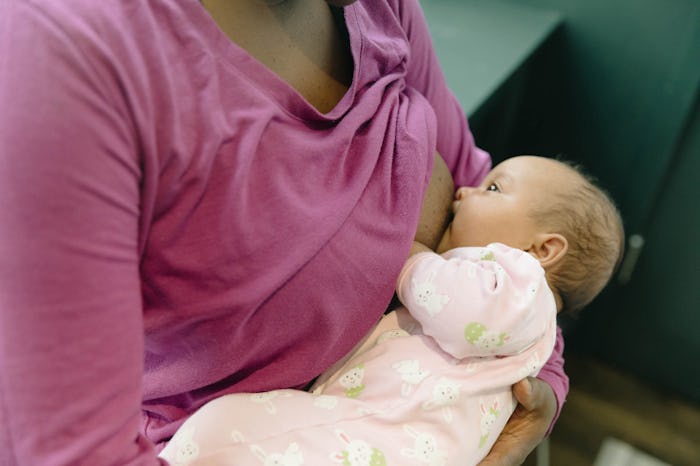When you think about it, babies are truly incredible. It's unbelievable that a sperm and egg can combine, grow inside our bodies, and emerge as human beings. Then, in their first year of life, they grow and develop exponentially from snuggly newborns into sassy toddlers, constantly changing along the way. Some of those changes happen right away, too, like when they're enjoying their first meal. In fact, there are so many things your baby's body is doing while breastfeeding, it might just blow your mind.
According to the Infant Nutrition Council, breast milk is pretty much a perfect food for babies, containing a balance of protein, fat, and carbohydrates that can help them grow and thrive. As they snuggle against you, and feel your love, warmth, and touch, their body produces endorphins — feel good hormones — which a Cochrane Review shows can help relieve pain. Their body temperature stabilizes also stabilized, and they are able to relax. In addition to nutrition and snuggles, breastfeeding may also give your baby important protection from some types of infections. And of course, what goes in must come out, and breast milk is no exception. Breastfed babies poop, a lot.
Next time you are feeding your baby, stop and consider all of the things that are happening in their body. It's actually pretty amazing.
Metabolizing Breast Milk
Sometimes, in an attempt to promote breastfeeding, I think we forget that breast milk is food. According to the Infant Nutrition Council, breast milk contains everything a baby's body and brain needs to grow and develop during their first six months of life. After that, breast milk or formula should still be their primary source of nutrition, along with complementary foods.
Burning Calories
Most people know that producing breast milk helps moms burn calories, but did you know that the act of breastfeeding is actually a major calorie burner for babies, too? This is why some babies may need extra calories their first few days of life. According to Dr. Christie Del Castillo-Hegyi, co-founder of the Fed is Best Foundation, continuous nursing might be a sign of insufficient milk. Dr. Christie Del Castillo-Hegyi writes:
"A child who is 'cluster-feeding' may actually burn more calories breastfeeding than they receive in return, which can result in fasting conditions and accelerated weight loss."
Rooting, Suckling, & Swallowing
According to the World Health Organization (WHO), your baby will do a series of things reflexively when nursing to encourage milk flow, including rooting, suckling, swallowing, kneading your breasts with their hands, or grabbing them with their tiny, probably sharp nails. These reflexes actually started in the womb, and also lead your baby to suck their hands when they are hungry or tired.
Relaxing
Anyone who's ever seen a "milk drunk" newborn knows that breastfeeding can be super relaxing for babies. But it can also, according to a Cochrane Review of several studies, help relieve pain from medical procedures, like blood draws or vaccines. The theory is that breast milk contains high amounts of sugars, which cause a baby's body to release endorphins.
Getting Warm
According to the Cleveland Clinic, feeding your baby, especially skin-to-skin and when done safely, can help regulate their body temperature and breathing, help both of you relax, help establish breastfeeding, and even stabilize their blood sugar.
Acquiring Passive Immunity
According to Jody Segrave-Daly, RN, MS, an International Board Certified Lactation Consultant, babies can acquire what's called "passive immunity" from breast milk, which can protect them from some types of infections. As Segrave-Daly writes for The Scientific Parent,
Colostrum is the first milk a woman produces when she begins to breastfeed, and it contains large numbers of antibodies called secretory immunoglobulin. You’ll see this abbreviated as IgA. Human babies are not able to absorb these passive maternal antibodies from milk or colostrum directly into their bloodstream. Instead, the IgA antibodies in milk and colostrum protect against infection by working inside the baby’s gastrointestinal tract, a clear protective role of human milk.
Making Poop
So, yeah, before I became a mom I rarely thought about poop. Now it's all I think about. According to the American Academy of Pediatrics, during your babies first few days of life breast milk acts as a mild laxative, helping them to pass their first thick black or dark-green meconium. After that, many babies will poop while they are eating, or soon after, as a result of the gastrocolic reflex to a tummy full of food, a fact I learned the hard way after a few days of changing my baby before feeding him. The more you know.
Check out Romper's new video series, Romper's Doula Diaries:
Watch full episodes of Romper's Doula Diaries on Facebook Watch.
